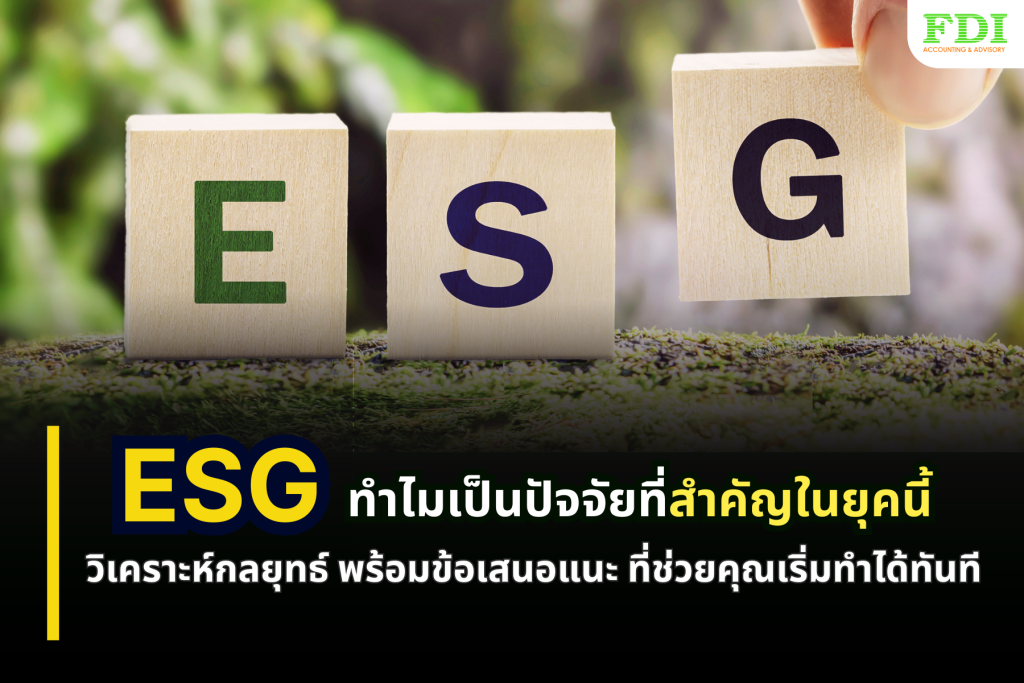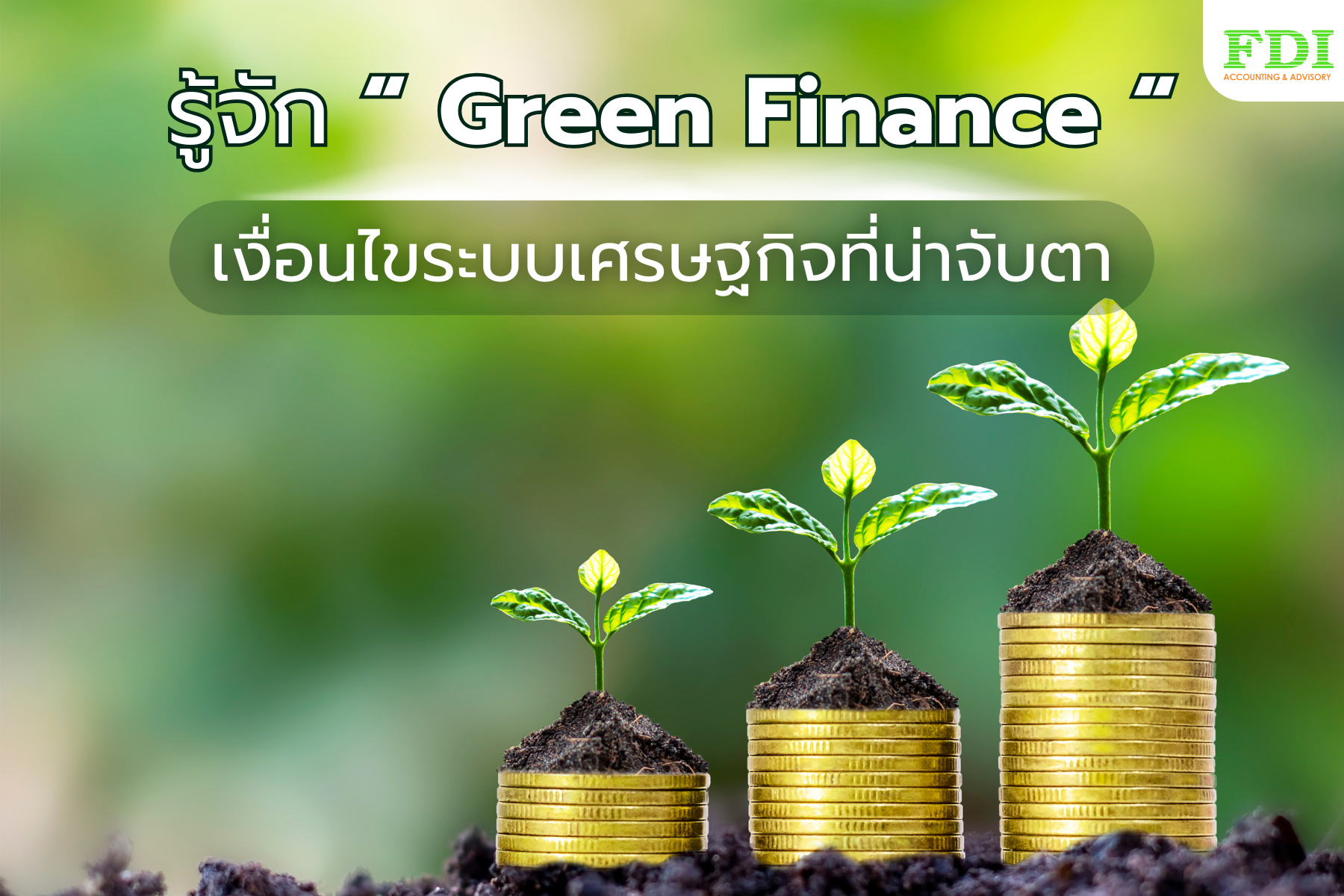ESG (Environment, Social, Governance)
Key Factors Investors Look for in the Era of Sustainable Capital Markets
The investment landscape of the 21st century has undergone a significant transformation from the past. Today, both institutional and individual investors focus not only on generating financial returns but also on the impact that companies have on the environment, society, and corporate governance. The growth of ESG (Environmental, Social, and Governance) funds worldwide clearly reflects this paradigm shift. According to ESG Today, global sustainable funds reached a total value of USD 3.2 trillion by the end of 2024. In Thailand, the Bangkok Post reported that 2024 marked a year of significant growth for ESG funds in the Thai capital market. This trend indicates that integrating ESG principles into business strategies is not merely a matter of corporate social responsibility but has become a key factor in attracting investment and gaining a competitive advantage. A crucial question to consider is: why do investors choose to allocate capital to companies with strong ESG performance over conventional ones, and what factors drive investment decisions in this dimension?
Meaning and Importance of ESG for Investors
ESG consists of three core pillars that reflect an organization’s sustainability and responsibility: Environmental covering resource management, reduction of greenhouse gas emissions, and adaptation to climate change. Social relating to employee treatment, supply chain practices, human rights, and community relations. Governance encompassing board structure, transparency, internal controls, and business ethics.
For investors, ESG is not merely an ethical screening tool but a comprehensive framework for analyzing risks and opportunities that traditional financial statements cannot fully capture. Companies with strong ESG performance often demonstrate better capabilities in mitigating legal risks—such as lawsuits related to environmental or labor issues—reputational risks from non-transparent business practices, and operational risks arising from resource shortages or regulatory changes. The Stock Exchange of Thailand (SET) has developed the SET ESG Ratings 2024 system to assess and rank listed companies based on these principles, while the Thaipat Institute has selected the ESG100 companies for 2024. These initiatives highlight how investors can systematically use such information to make more informed investment decisions.
Investor Behavior and ESG
The shift in investor behavior toward ESG has become increasingly evident at both institutional and individual levels. Institutional investors particularly pension funds and large mutual funds have incorporated ESG principles into their official investment policies. The main reason is that these institutions have long-term obligations to their beneficiaries and must therefore consider potential future risks, such as the impacts of climate change or social imbalances. According to Morningstar’s U.S. Sustainable Funds Landscape 2024 report, there has been a consistent inflow of capital into sustainable funds. Although fluctuations occur from time to time, the overall trend remains positive. Morningstar also reported that global ESG funds attracted USD 10.4 billion in investments during the third quarter of 2024, reflecting investors’ growing confidence in sustainability-focused investment strategies.
For retail investors, the growing emphasis on ESG is driven by several factors. First, there is an increasing awareness that companies with strong ESG performance tend to be more stable and capable of generating sustainable long-term returns, thanks to better risk management and the establishment of lasting relationships with all stakeholders. Second, personal values play a significant role. Younger generations—particularly Millennials and Gen Z—are more inclined to invest in companies that align with their own beliefs and values, whether related to environmental protection, labor rights, or gender equality.
The key factors influencing investment decisions in ESG-oriented companies can be categorized into four main aspects: Long-term risk reduction – Companies that prioritize environmental stewardship are less likely to face future fines or legal restrictions. Transparency and disclosure – Companies that provide comprehensive ESG reporting demonstrate good governance and accountability to shareholders. Sustainable returns – Research titled “ESG Performance Impacting on Systematic Risk of the Listed Companies on the Stock Exchange of Thailand” indicates that ESG performance affects the systematic risk of listed companies on the Thai Stock Exchange. Reputation and credibility – Companies with high ESG scores tend to gain greater trust from customers, business partners, and investors.
A clear example can be seen in Thai companies listed in the ESG100 by the Thaipat Institute, which are often the primary targets of both domestic and international institutional investors. In addition, the Securities and Exchange Commission (SEC) of Thailand has been actively promoting ESG integration in the Thai capital market to enhance standards and strengthen its global competitiveness. At the international level, technology and clean energy companies with well-defined ESG policies consistently attract capital allocation from large investment funds.
Analysis of Strategies and Recommendations by Experts in ESG
ChatGPT said: Genuine ESG implementation enhances a company’s stability and credibility across multiple dimensions — from building business resilience during crises, reducing operational costs through efficient resource use, to gaining a competitive advantage through a positive corporate image. The Deloitte 2024 Sustainability Action Report emphasizes that organizations integrating sustainability into their core strategies tend to generate stronger long-term value. Meanwhile, Bloomberg Intelligence, in its ESG Market Outlook 2024, observes that the ESG market will continue to expand despite certain challenges.
However, ESG assessment still faces key limitations that both investors and companies must recognize—most notably, the inconsistency of ESG ratings across different rating agencies. A company may receive a high score from one agency but a low score from another due to differences in evaluation methodologies, weighting criteria, and data sources. This inconsistency creates confusion among investors and can lead to less effective investment decisions.
For Thai companies, ESG development should be genuine and aligned with their business context — not merely a matter of image-building or “greenwashing.” Companies should start by conducting a Materiality Assessment to identify the most significant impacts, set measurable targets, and report progress transparently. Active involvement from the board of directors and senior management is essential, as ESG is not the responsibility of a single department but must be integrated into the organization’s overall strategy.
The conclusion of ESG is not an option, but a necessity and an opportunity for business.
Investors’ growing focus on ESG reflects the evolution of capital markets — from viewing profitability purely through financial statements to assessing a company’s ability to create sustainable value and manage risks across all dimensions. ESG has become one of the key criteria in corporate valuation today and is expected to gain even greater importance in the future, as disclosure requirements and sustainability standards continue to tighten worldwide.
For companies seeking to attract capital in the modern era, integrating ESG into their core strategy is not a choice—but a necessity. Investing in environmental initiatives, human resource development, and transparent governance systems helps build competitive advantages, lower the cost of capital, and open access to diverse funding sources. Ultimately, ESG is not a burden but an opportunity to build a strong, sustainable business that earns the trust of both investors and society.
FDI Group: Comprehensive Carbon Footprint Consulting and Environmental Expert Team.
FDI Group has consistently dedicated itself to developing services that meet the diverse needs of clients. We are committed to further expanding our services to cover all dimensions — unlocking every potential of each business to grow exponentially and sustainably. We firmly believe that every organization that has begun to manage and reduce greenhouse gas emissions recognizes the importance of environmental collaboration across all sectors, accelerating efforts to reduce emissions as quickly as possible for the sustainability of both Thai and global societies.FDI began providing environmental consulting services to various companies in 2023 and has since offered professional guidance to over 60 companies, with more than 70 projects completed in the past year.
categorized into three groups as follows
1.Companies undergoing in-house training to prepare for Carbon Footprint assessment.
2.Companies currently in the process of data preparation and assessment for registration.
3.Companies that have completed Carbon Footprint assessment and registration.
FDI has been officially registered as both an individual and corporate consultant with the Thailand Greenhouse Gas Management Organization (TGO).
- We are ready to provide comprehensive environmental and sustainability consulting services — all in one place.
- Specialized employee training (by industry sector) conducted by a team of environmental and sustainability experts.
- Assessment of Carbon Footprint for organizational (CFO) and Carbon Footprint product (CFP).
- Development of ESG / SDGs / Net Zero Roadmap systems.
- Consulting services for CBAM Certification and Carbon Credit.
- Including environmental and sustainability projects within the organization.
Contact us
- Facebook : FDI Group – Business Consulting
- @fdigroup
- Phone : 02-642-6866, 02-642-6869, 02-642-6895
- E-mail : infojob@fdi.co.th
- Website : www.fdi.co.th
BlogArticles
The Importance of “Green Finance”: When Finance Becomes a Tool to Drive a Low-Carbon Economy
ในยุคที่การเปลี่ยนแปลงสภาพภูมิอากาศ (climate change)...
Read MoreHow can businesses and consumers collaborate to reduce their carbon footprint ?
ในยุคที่วิกฤตการเปลี่ยนแปลงสภาพภูมิอากาศ (Climate Change)...
Read MoreWhat is Thailand Taxonomy? A new standard for a low-carbon society.
เคยสงสัยกันหรือไม่ ? ว่าการดำเนินงานด้านสิ่งแวดล้อมของแต่ละธุรกิจดำเนินการกันจริงจังหรือทำเพื่อกล่าวอ้าง...
Read More






